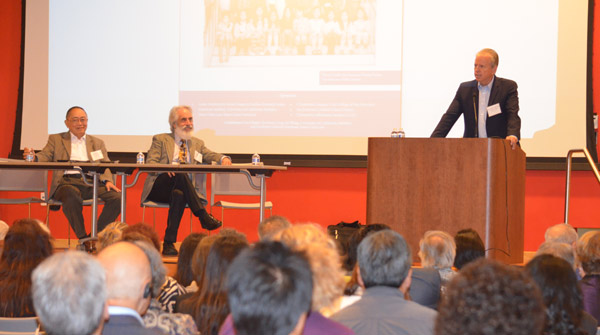Conference reflects on key court decision involving Chinese students
Updated: 2014-09-13 07:18
By LIAN ZI in San Francisco(China Daily USA)
|
|||||||||
 |
|
From left: Wang Ling-chi, professor of Ethnic Studies at University of California, Berkeley; Edward Steinman, Attorney General of US Department of Justice; and Stanley Pottinger, former US Assistant Attorney General of US Department of Justice-Civil Rights Division talk about the history of the Lau v. Nichols case during a national conference on the rights of linguistic minorities at City College of San Francisco on Friday. Lian Zi / China Daily |
Marking the 40th anniversary of a key Supreme Court decision, academic scholars, community leaders, government officials and policymakers attended a national conference on the rights of linguistic minorities at City College of San Francisco on Friday.
Lau v. Nichols is considered a landmark civil rights case that was initiated by Chinese-American students who lived in San Francisco. The students, many of whom had limited proficiency in English, claimed that they were not receiving special help in their classes. In 1974, the Supreme Court unanimously ruled that the San Francisco Board of Education illegally discriminated against non-and limited-English speaking Chinese students by denying them equal educational opportunities.
The conference was held to commemorate and revisit Lau v. Nichols; to examine the impact of the decision on the educational rights of minorities and on bilingual services, according to Wang Ling-chi, professor of Ethnic Studies at University of California Berkeley.
"If you don't understand English, Chinese immigrants who come into American public schools were totally blind if they cannot read; totally deaf because they cannot understand what they are hearing; and totally dumb because they cannot say anything," said Wang.
As a result of the court case, bilingual programs and English-learning programs have made tremendous progress in the US, especially in the San Francisco area, due to the effort of community leaders, academic scholars and government agencies.
Libia Gil, assistant deputy secretary and director of English Language Acquisition at the US Department of Education, told China Daily, "We are promoting multi- literacy and suggesting that all of our students should have more than one language since we want to provide them a global future."
According to a new study released by Stanford University, the bilingual language program, or the dual language program in San Francisco is doing very well, said Gil.
Gil added that the idea of a bilingual program is not to take away a language, but to educate students in two languages.
More schools now offer bilingual instruction. Right now, one of the more popular models is the immersion program.
"My own children and grandchildren attended the program and can speak Chinese and English very fluently," said Wang.
When some children enter kindergarten, they have learned nothing but Chinese, said Wang. As they grow up, schools will increase English classes slowly so that students can be proficient in both languages.
The immersion program is not only for Chinese students, said Gil.
"It is no problem for new immigrants to learn English, but it is equally important for Chinese parents to make sure that their own children do not forget Chinese language and culture, which is the main idea of the dual language program," said Wang.
zilian@chinadailyusa.com
Most Viewed
Editor's Picks

|

|

|

|

|

|
Today's Top News
Xi calls for three-way economic corridor
Paulson, Rudd tackle China's future
VW and Chrysler hit with fines for price-fix
Exhibit recounts Shanghai's Jewish refugees in WWII
VW, Chrysler fined for price-fixing
South African judge clears Pistorius of murder
Xi, Putin meet ahead of SCO summit
Obama: Joint force vs ISIS
US Weekly

|

|
















